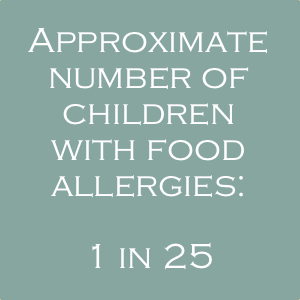A big thanks to the team at Healthline for sharing this article with our readers! They share our belief in the dangers of food allergies, and are urging readers to take food allergies and sensitivities seriously. We couldn’t agree more, and appreciate their taking the time to help spread the word so we can live healthier lives with a greater awareness and more tolerance thanks to the benefit of food allergy awareness.
What are Food Allergies?
A reaction in the immune system that occurs after eating a certain food is defined as a food allergy. Ignoring food allergies is not going to make them go away and could be endangering your life. Even a small amount of the food that triggers the allergy can cause symptoms and signs to occur such as:
- Swollen airways
- Hives
- Digestive issues
- Anaphylaxis

Dangers of Food Allergies
As many as eight percent of children below the age of five and up to four percent of adults are thought to be affected by allergies to food; there is no cure but some children outgrow such allergies. It is easy to confuse an allergy to a food with intolerance to a food. Intolerance is not as severe and does not include the immune system.
The most common symptoms of having a food allergy are:
- Eczema, itching or hives
- Itching or tingling in the mouth
- Swelling of body parts including tongue, face, lips and throat
- Fainting, feeling lightheaded or dizzy
- Pain in the abdomen, vomiting, nausea, diarrhea
- Trouble breathing, wheezing or congestion
Food Allergies Have Deadly Potential
There are those that have more severe and life threatening reactions to allergies from food. This reaction is known as anaphylaxis and could be deadly which makes it important that food allergies are not ignored. Symptoms of this life threatening reaction include:
- Increase in pulse rate
- Feeling lightheaded, dizzy or losing consciousness
- Severe drop in blood pressure that accompanies shock
- Difficulty breathing because of a lump sensation or swelling in the throat
- Airways tighten or constrict
Coma or even death can result when emergency treatment is not received for anaphylaxis.
Exercise and Food Allergies
There are those who can have a food allergy that exercise triggers. There are certain foods that will cause you to have a reaction shortly after you begin exercising. The reactions can vary:
- Itching
- Lightheadedness
- Hives
- Anaphylaxis
Pollen-food Allergy Syndrome
An allergic reaction resulting itching or tingling in the mouth can result from some nuts, vegetables and fresh fruits in those that have hay fever. Throat swelling or anaphylaxis can result from the oral allergy syndrome. The protein in the pollens that cause the allergy is similar to the fruit protein, which causes the reaction.
Symptoms that appear shortly after you have eaten means that you should go see an allergist or a doctor. It will be easier to get a diagnosis if you can make the visit during the reaction.
Emergency treatment is necessary if you have any of the symptoms associated with anaphylaxis.
Allergic Reaction Causes:
- Food or substance mistakenly identified as harmful by the immune system
- Immunoglobulin E antibodies are released to fight the allergen
- Histamine and chemicals are released when the food is eaten again
The chemicals will result in the symptoms of the allergy and cause allergic responses. The responses include dry throat, hives, rashes, diarrhea, labored breathing, dripping nose or anaphylactic shock.
This means that it is critical that you do not continue eating foods that result in food allergies. It could save your life if you treat them instead of ignoring them.
About our author: Tammy Mahan has 20 years of experience in the healthcare field. She is also a freelance writer and often shares her knowledge on Healthline.com .
